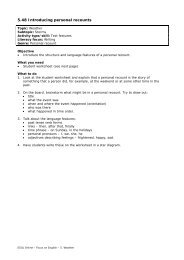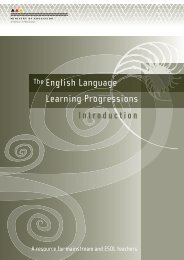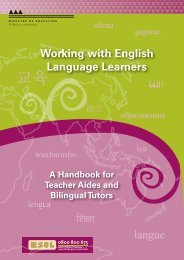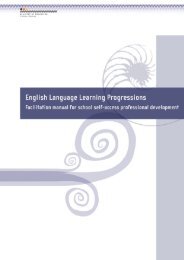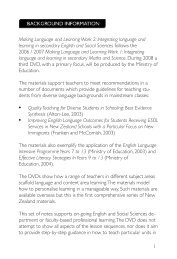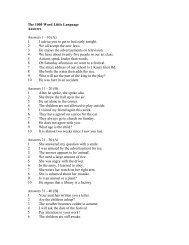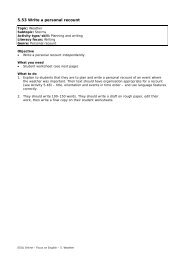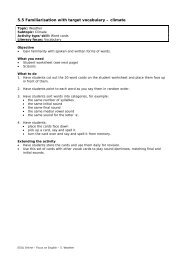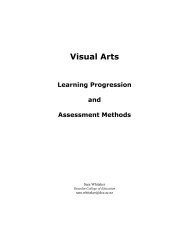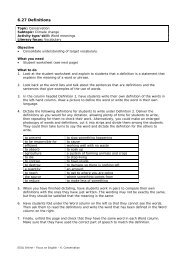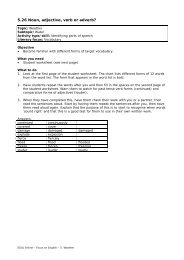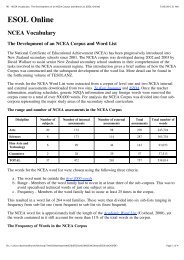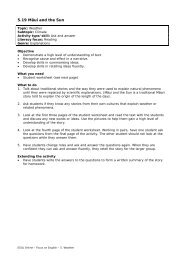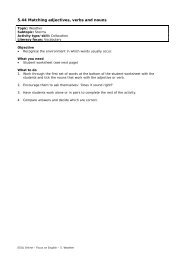ELLP Years1-4 - ESOL - Literacy Online - Te Kete Ipurangi
ELLP Years1-4 - ESOL - Literacy Online - Te Kete Ipurangi
ELLP Years1-4 - ESOL - Literacy Online - Te Kete Ipurangi
Create successful ePaper yourself
Turn your PDF publications into a flip-book with our unique Google optimized e-Paper software.
Stage 1C<br />
The following sample text is at Stage 1C because it is fairly short and the sentences are mostly<br />
simple or compound.<br />
<strong>Te</strong>xts at Stage 1C tend to have the following characteristics:<br />
– about three sentences per page;<br />
– a variety of sentence beginnings;<br />
– ideas presented in a simple sequence;<br />
– good support from illustrations;<br />
– little repetition;<br />
– use of high-frequency words and some lower-frequency, topic-specific words;<br />
– use of simple and compound sentences.<br />
Other examples of texts at Stage 1C include those found at the fluency levels on the colour wheel in<br />
the Ready to Read series books and their commercially published equivalents.<br />
Sample text<br />
<strong>Te</strong>xt: Quinn, Pat and Gaynor, Bill (1995). Wind Power. Ready to Read series.<br />
Wellington: Learning Media.<br />
Topic: The generation of electricity through wind power, using a wind<br />
turbine<br />
<strong>Te</strong>xt type: Explanation<br />
Audience: A reader who wants to know about wind turbines<br />
28<br />
Topic development<br />
The text begins with a personal<br />
description and then moves into the<br />
explanation. The narrator describes<br />
the location of the wind turbine, why<br />
it’s there, what it looks like, and how<br />
it works. Although it is a personal<br />
account, the text is also technically<br />
accurate and informative. There is<br />
a diagram on the inside back cover.<br />
Language structures<br />
The sentences are sometimes<br />
simple, but these are often<br />
expanded through adverbial<br />
phrases of time, place, or manner<br />
– We love to walk up the hill behind<br />
our house. They are sometimes<br />
complex, with at least two clauses<br />
– It sounds like a windmill (main<br />
clause) as the blades twirl around<br />
(subordinate clause).<br />
Wind Power<br />
We love to walk up the hill behind our house.<br />
You can see the whole city.<br />
You can see right out to the ocean.<br />
The wind blows there most of the time.<br />
It blows the grass flat.<br />
It’s too windy for trees to grow.<br />
At the top of the hill there is a big machine.<br />
A wind turbine.<br />
The turbine looks like a windmill.<br />
It sounds like a windmill as the blades twirl around.<br />
Swoosh! Swoosh! Swoosh!<br />
The wind blows the blades around.<br />
The blades turn the generator.<br />
The generator makes electricity.<br />
And we use electricity every day,<br />
for all kinds of things …



